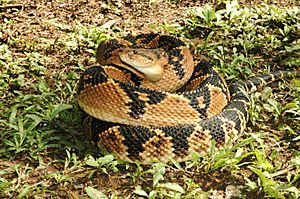Lachesis (genus) facts for kids
Quick facts for kids Lachesis |
|
|---|---|
 |
|
| A South American bushmaster, Lachesis muta | |
| Scientific classification | |
| Kingdom: | |
| Phylum: | |
| Subphylum: | |
| Class: | |
| Order: | |
| Suborder: | |
| Family: | |
| Subfamily: | |
| Genus: |
Lachesis
|
Lachesis, often called "bushmasters", is a group of very venomous pit vipers. These snakes live in the forests of Central and South America. The name "Lachesis" comes from Greek mythology. It was the name of one of the Three Fates. There are currently three known species of bushmasters.
Contents
What Are Bushmasters Like?
Adult bushmasters can grow very long. They are usually about 2 to 2.5 meters (6.5 to 8.25 feet) in length. Some have even been found to be 3 meters (10 feet) long! The longest bushmaster ever found was an amazing 3.65 meters (12 feet) long. This makes them the longest venomous snakes in the Western Hemisphere. They are also the longest vipers in the whole world. While they are not the heaviest vipers, adult bushmasters often weigh between 3 and 5 kilograms (6.6 to 11 pounds).
Where Bushmasters Live
Bushmasters live in forest areas. You can find them in parts of Central America and South America. They also live on the island of Trinidad.
Bushmaster Reproduction
Bushmasters are special because they are oviparous. This means they lay eggs. Most other pit vipers in the New World are viviparous. This means they give birth to live young instead of laying eggs. A female bushmaster can lay about a dozen eggs at one time. The mother snake stays with her eggs until they hatch. She will protect her nest from any animals that try to get too close.
Bushmaster Venom
Bushmasters are some of the largest and most dangerous snakes in South America. They can inject a lot of venom when they bite. Even young bushmasters have harmful bites. However, bushmasters are nocturnal. This means they are most active at night. Because of this, not many people have been bitten by them.
Types of Bushmasters
- Black-headed bushmaster, L. melanocephala
- South American bushmaster, L. muta
- Central American bushmaster, L. stenophrys
See Also

- In Spanish: Lachesis para niños

